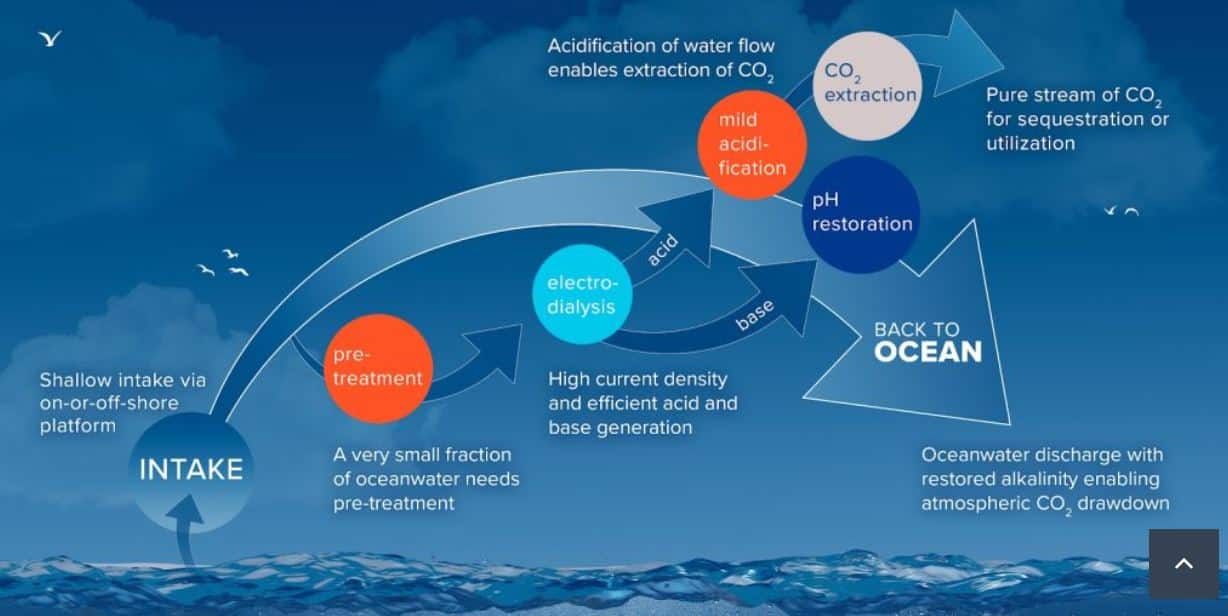Caltech researchers have founded a startup called Captura, which aims to develop direct ocean capture (DOC) technology. This technology seeks to filter CO2 out of seawater, enabling oceans to absorb more greenhouse gasses.
As a result, less CO2 remains in the atmosphere, which contributes to climate change.
The project has the backing of fossil fuel giants and Big Tech companies. However, the technology is still in its early stages and needs to prove its effectiveness and potential side effects.
Harnessing Henry’s Law to Combat Climate Change
Captura was established in 2021 and subsequently won a $1 million award from Elon Musk’s XPrize competition in 2022. With funding from the US’s largest gas utility, the startup is now setting up its most significant pilot project at the Port of Los Angeles. This project will test the feasibility and environmental impact of the technology.
The underlying principle of Captura’s technology is Henry’s Law. The law seeks to establish an equilibrium between the concentration of CO2 in the atmosphere and the oceans.
The Captura DOC Process
The Captura process starts by pulling a stream of filtered ocean water into its system. Less than 1% of this water is pre-processed to purify the seawater into pure salt water. This water is then processed in the company’s patented electrodialysis technology.
By drawing CO2 out of seawater through electrodialysis, the technology aims to capture the gas for storage or sale as a product. Once treated, the CO2-deficient water is released back into the ocean, allowing it to absorb more CO2 from the atmosphere.
Captura’s process uses only renewable electricity and ocean water to remove CO2 from the air with no by-products and no absorbents.
Addressing Environmental Concerns and Industry Skepticism
The pilot project at the Port of Los Angeles is a significant scale-up compared to Captura’s first pilot in Newport Beach, California, launched in August last year. This new direct ocean capture project aims to remove approximately 100 tons of CO2 from the ocean annually. This amount is equivalent to taking 22 cars off the road for a year.
The primary goal of the pilot is to test the technology under real-world conditions and ensure its impact on ocean water is benign.
Captura’s First Pilot in Newport Beach, California
However, conservation groups have expressed concerns about the technology’s potential risks. One such risk is the possibility of plankton being filtered out during the water treatment process.
Plankton forms the base of the entire marine food web, and many other marine animals depend on these microscopic organisms for sustenance.
Another concern is the potential for increased industrial activity and noise pollution in already stressed marine ecosystems. The technology requires the filtering of seawater, which could lead to additional stress on marine life.
Moreover, the long-term storage of captured CO2 raises questions about the environmental impact and potential leakage of stored gas.
Skepticism also arises from the involvement of fossil fuel companies in funding carbon removal projects. Critics argue that these companies may be using carbon removal technologies as a distraction from the need to reduce fossil fuel extraction and use. This skepticism has led to questions about the technology’s role as a genuine climate solution.
Bolstering the Value of Direct Ocean Capture
Despite these concerns, Captura has secured a contract with Frontier, an initiative backed by Stripe, Alphabet, Meta, Shopify, and McKinsey. The goal of this initiative is to make it easier for companies to offset emissions through emerging carbon removal technologies. Through Frontier, Captura plans to sell carbon credits representing tons of CO2 removed from the ocean.
The carbon credits will likely come from another pilot plant scheduled for construction next year. By selling these credits, Captura aims to demonstrate the value of its technology in combating climate change.
The success of the pilot projects will be crucial in determining the viability and environmental impact of DOC technology.
In conclusion, Captura’s direct ocean capture technology has the potential to make a significant contribution to reducing CO2 levels in the atmosphere. However, the technology is still in its infancy and must prove its effectiveness and environmental impact.
The involvement of fossil fuel companies in funding carbon removal projects raises concerns about the technology’s role in truly providing a climate solution. Despite this, the DOC startup still managed to secure a contract with large companies.
The results of Captura’s pilot projects will be crucial in determining the technology’s potential as a viable and eco-friendly solution to combat climate change.


